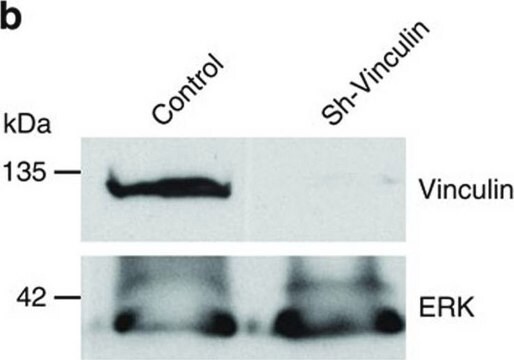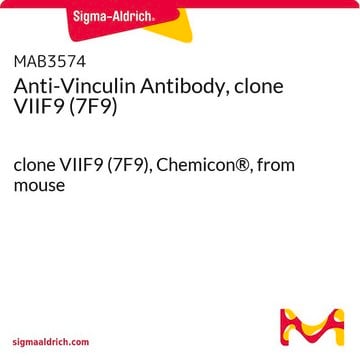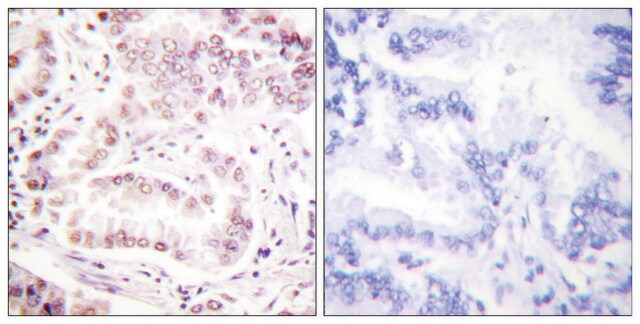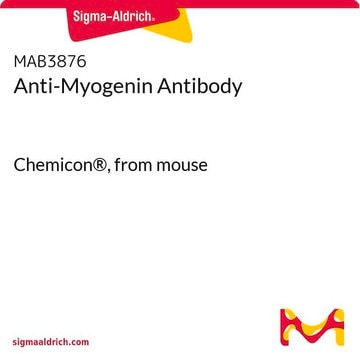SAB4700284
Monoclonal Anti-CD15 antibody produced in mouse
clone MEM-158, purified immunoglobulin, buffered aqueous solution
Sinónimos:
Anti-FUT4, Anti-Lewis x Blood Group antigen
Iniciar sesiónpara Ver la Fijación de precios por contrato y de la organización
About This Item
UNSPSC Code:
12352203
NACRES:
NA.41
Productos recomendados
biological source
mouse
Quality Level
conjugate
unconjugated
antibody form
purified immunoglobulin
antibody product type
primary antibodies
clone
MEM-158, monoclonal
form
buffered aqueous solution
species reactivity
human
concentration
1 mg/mL
technique(s)
flow cytometry: suitable
isotype
IgM
NCBI accession no.
UniProt accession no.
shipped in
wet ice
storage temp.
2-8°C
target post-translational modification
unmodified
Gene Information
human ... FUT4(2526)
General description
Cluster of differentiation 15 (CD15), also known as fucosyltransferase 4 (FUT4)/ Lewis x blood group antigen, is encoded by the gene mapped to long arm of human chromosome 11q21. It is ubiquitously expressed in various tissues such as gastrointestinal tract, brain and leukocytes.
The antibody MEM-158 reacts with CD15, a cell membrane molecule 3-fucosyl-N-acetyllactosamine (3-FAL) strongly expressed on granulocytes, monocytes, macrophages, mast cells; it is also present on Langerhans cells and some myeloid precursors cells.
Immunogen
Human granulocytes
Application
The reagent is designed for Flow Cytometry analysis using 10 μL reagent / 100 μL of sample.
Biochem/physiol Actions
Cluster of differentiation 15 (CD15)/fucosyltransferase 4 catalyzes the synthesis of Lex on the surface of the proliferating cells, in organ buds progressing in mesenchyma, during human embryogenesis. Overexpression of the gene has been associated with development of various type of cancers such as colon cancer, pancreatic cancer, gastric cancer and lung adenocarcinoma. siRNAs of FUT1/4 can be used as a potent therapeutic agent in human LeY-expressing cancers.
Features and Benefits
Evaluate our antibodies with complete peace of mind. If the antibody does not perform in your application, we will issue a full credit or replacement antibody. Learn more.
Physical form
Solution in phosphate buffered saline, pH 7.4, with 15 mM sodium azide.
Disclaimer
Unless otherwise stated in our catalog or other company documentation accompanying the product(s), our products are intended for research use only and are not to be used for any other purpose, which includes but is not limited to, unauthorized commercial uses, in vitro diagnostic uses, ex vivo or in vivo therapeutic uses or any type of consumption or application to humans or animals.
¿No encuentra el producto adecuado?
Pruebe nuestro Herramienta de selección de productos.
Storage Class
10 - Combustible liquids
flash_point_f
Not applicable
flash_point_c
Not applicable
Elija entre una de las versiones más recientes:
¿Ya tiene este producto?
Encuentre la documentación para los productos que ha comprado recientemente en la Biblioteca de documentos.
Sakiko Masuda et al.
The American journal of pathology, 189(4), 839-846 (2019-01-25)
Antineutrophil cytoplasmic antibody (ANCA)-associated vasculitis (AAV) is characterized by the production of ANCAs and systemic necrotizing vasculitis in small vessels. Disordered regulation of neutrophil extracellular traps (NETs) is critically involved in the pathogenesis of AAV. NETs are web-like DNA decorated
Wei Jin et al.
Annals of surgical oncology, 26(2), 635-643 (2018-10-31)
Tumor-infiltrating neutrophils (TINs) indicate poor prognosis for patients with pancreatic ductal adenocarcinoma (PDAC). Activated neutrophils can generate neutrophil extracellular traps (NETs). Little is known about the presence and prognostic significance of tumor-infiltrating NETs in PDAC. This study enrolled 317 patients
The gene encoding myeloid alpha-3-fucosyl-transferase (FUT4) is located between D1 1S388 and D11S919 on 11q21.
Reguigne I
Cytogenetics and Cell Genetics, 66, 104-106 (1994)
Li-Ning Jiang et al.
Asian journal of andrology (2018-09-11)
Lycopene is a natural compound that alleviates oxidative stress and inflammation, exerting therapeutic effects in a number of cancers. The aim of this study is to investigate the efficacy of lycopene in inhibiting prostate cancer. Cell viability assays indicated the
Filippo Veglia et al.
Nature, 569(7754), 73-78 (2019-04-19)
Polymorphonuclear myeloid-derived suppressor cells (PMN-MDSCs) are pathologically activated neutrophils that are crucial for the regulation of immune responses in cancer. These cells contribute to the failure of cancer therapies and are associated with poor clinical outcomes. Despite recent advances in
Nuestro equipo de científicos tiene experiencia en todas las áreas de investigación: Ciencias de la vida, Ciencia de los materiales, Síntesis química, Cromatografía, Analítica y muchas otras.
Póngase en contacto con el Servicio técnico








